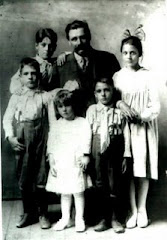
In chapter 11 of Genesis we are introduced to a descendant of Noah's son Shem, by the name of Terah. This patriarach left his home of Ur and moved his immediate family to Haran. Why did he do this? Terah willingly submitted to God's will for his son Abram, this meant changing where he lived.(Gen 11:26-32). Later, after Terah died, Abram is given a promise that effects all mankind.
Listen to God's promise to Abram, "Go your way out of your country and from your relatives...to a country that I shall show you; and I shall make a great nation out of you...and all the families of the ground will certainly bless themselves by means of you." -Genesis 12:1-3. Obedient to Jehovah's direction Abram with his adopted nephew Lot, crossed the Euphrates River into Canaan. -Gen 12:5 (Compare:Acts 7:2-4) It appears this covenant went into effect when Abram crossed the Euphrates. The Abrahamic covenant is "a covenant to time indefinite" and remains in effect until the blessing of the families of the earth and the destruction of all God's enemies have been accomplished. - Gen 17:7; 1 Corith 15:23-26.
Listen to God's promise to Abram, "Go your way out of your country and from your relatives...to a country that I shall show you; and I shall make a great nation out of you...and all the families of the ground will certainly bless themselves by means of you." -Genesis 12:1-3. Obedient to Jehovah's direction Abram with his adopted nephew Lot, crossed the Euphrates River into Canaan. -Gen 12:5 (Compare:Acts 7:2-4) It appears this covenant went into effect when Abram crossed the Euphrates. The Abrahamic covenant is "a covenant to time indefinite" and remains in effect until the blessing of the families of the earth and the destruction of all God's enemies have been accomplished. - Gen 17:7; 1 Corith 15:23-26.
Put yourself in his position, Abram was leaving a comfortable, prosperous city and his extended family -which was an important source of security in patriarachal times. He and his family obediently ventured out into an unfamiliar land. Once he was in Canaan he did not seek safety inside city walls. Instead, he followed Jehovah's instructions to "go about in the land" with his family, dwelling in tents. "By faith (Abram) resided as an alien resident" -Hebrew 11:9 (Gen 12:4; 13:17.)

They relied only on Jehovah for protection and support. (Compare: Prov 18:10) As, you will see this support was needed. Abram and his household remained faithful despite many tests.
While Jehovah did not direct Abram to be dishonest, we must remember, that God uses imperfect people to accomplish His purposes. Abram's motives were noble for if he had met death in Egypt, the line of the Seed would have been broken, the Seed though whom "all the families of the earth would be blessed." In all this , Abram acted in the interests of the promised seed, that would effect all mankind.- (Compare: Gen 3:15; 22:17, 18; Gal 3:16)
What do you think? Can humans living today, develop faith like Abram's, even making radical changes in their lives to receive blessings that come from living in harmony with Jehovah's purposes? Like Abram will we put our full confidence in the promised Seed?





























2 comments:
Please read the sited scriptures in your own Bible. Yes, this is not dead history, God's word is alive!
hmmm?
Post a Comment